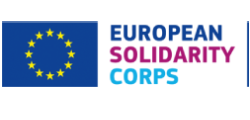Training and support for participants
The European Solidarity Corps provides a range of support services for participants, to ensure not only that you make the most out of your experience, but also that you learn as much as you can.
Infokit
General online training
This is an open-access training, via the Solidarity Corps site, for all registered candidates and participants. Modules include “The mission of the European Solidarity Corps”, “Roles and responsibilities of participants”, “Inter-cultural awareness”, “Health and safety” and more.
Training required for the participation in Humanitarian aid volunteering
This training includes a self-assessment and an online course, followed by an online test. Those who pass the test can be invited to a face-to-face course during 5 days in a training center in France, Germany, Italy or Spain. The self-assessment and the online training are accessible on the EU Academy platform to all candidate volunteers who have expressed their interest in humanitarian aid volunteering when they registered.
Online Language Support
Online Language Support (OLS) is designed to help participants improve their knowledge of the language they’ll be working in. The OLS is hosted on a corporate learning management platform of the European Commission called EU Academy.
The service is available for all official EU languages: Bulgarian, Czech, Danish, German, Greek, English, Estonian, Spanish, Finnish, French, Irish Gaelic, Croatian, Hungarian, Italian, Lithuanian, Latvian, Maltese, Dutch, Polish, Portuguese, Romanian, Slovak, Slovenian and Swedish. The online language learning service is additionally available for Basque, Galician and Catalan.
You can use the service if you’ve been selected for a Corps activity lasting 2 months or longer. After being selected for a Corps activity, you’ll receive an invitation email with login details to the OLS on the EU Academy platform from your host organisation.
Insurance
One key principle for all the activities carried out under the Corps is that participants must at all times be safe.
You will be insured during your activity from the moment you leave for the host country until 2 months after the activity ends, either by:
For cross-border activities:
- top-up coverage to supplement your European Health Insurance Card or the host country’s national health system (provided by the European Commission)
- primary coverage by the Commission – if you are unable to have the European Health Insurance Card for free, nor entitled to cover in the host country
For in-country activities:
- through reimbursement of any costs not covered by your national health system
You can find more details of the coverage, and how to enrol, on the website of the insurance company.
Participants will be covered by a different insurance provider depending on the period in which their project takes place. The Data Protection Notice of CIGNA insurance is valid for projects that are taking place under the Multiannual Financial Framework (MFF) 2014-2020 and for projects that started before 7 February 2023 under the current MFF 2021-2027. The Data Protection Notice of Henner insurance is valid for projects taking place under the current MFF 2021-2027.
Visas & residence permits
You may need one (or both) of these when moving between countries to take part in your Corps activity.
/!\ We strongly recommend you make your request for any such travel or residence permits well in advance, as the process may take several weeks.
For general information on visas and residence permits, for both short and long-term stays, see the EU immigration portal.
For details, contact the relevant National Agency or the Executive Agency.
Agreements with participants
Before leaving to start your activity, you must sign a participant agreement that determines at least the following aspects of your activity:
- rights and responsibilities with regards to insurance and financial contribution from the Corps
- tasks to be carried out during the activity (for volunteering)
- intended learning outcomes (for volunteering)
Training
This is a series of training events for participants in long-term activities that give you continuous guidance and support throughout your Corps experience. It helps you to adapt to cultural and personal challenges, learn about your rights and obligations, practical matters, intercultural communication, get to know other participants, stay in touch with National Agencies, assess your experience and more.
As a participant in a long-term activity, you will be offered the following sessions:
- pre-departure training (only cross-border activities)
- on-arrival training
- mid-term evaluation (only activities of 6 months and over)
- annual European Solidarity Corps events
Mentoring
While on-site, you should be provided with personal support in the form of mentoring, to help you settle in, in both the new country and the hosting organisation.
Youthpass
Youthpass – open to all Corps participants – is a tool that helps you identify and document the learning outcomes you developed on the project. It allows you to describe what you’ve done and show what you’ve learnt – including skills that are informal or non-formal.
This is all set out formally in a Youthpass certificate. So far, over 1 million people have used the tool and been awarded the certificate.
Depending on the type of recognition you need, the creation of a Youthpass certificate can also help you to reflect and create your Curriculum Vitae (CV) in Europass.
Check out some video testimonials on how important the Youthpass can be.
Certificate of participation
The certificate of participation certifies that you have taken part in European Solidarity Corps activities.
At the end of your time with the Corps, your certificate of participation will be issued via this website by one of the organisations involved in the activity. All you have to do is first fill in a survey to let us know how your experience went.
Having proof of the work you have done in the Solidarity Corps will be a valuable addition to your CV. And you can of course reference it if you use the Europe-wide EURES job opportunity portal.
